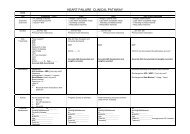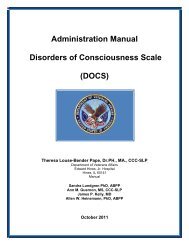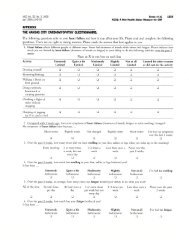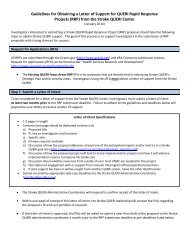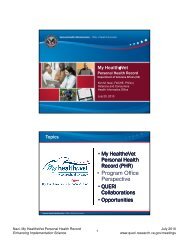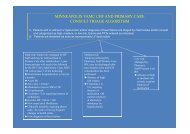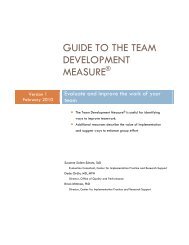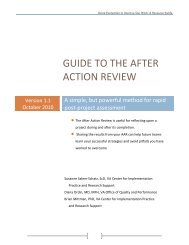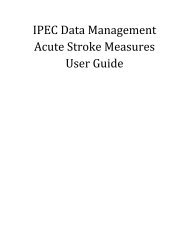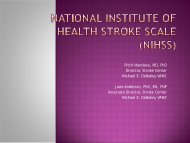The Veteran Supported Education Service Treatment Manual: VetSEd
The Veteran Supported Education Service Treatment Manual: VetSEd
The Veteran Supported Education Service Treatment Manual: VetSEd
Create successful ePaper yourself
Turn your PDF publications into a flip-book with our unique Google optimized e-Paper software.
ainstorm together all the resources that might be useful. You can then share this<br />
information with the <strong>Veteran</strong>. <strong>The</strong> other major reason for collecting this information is<br />
that <strong>Veteran</strong>s are likely to have multiple goals in several areas. Having an open<br />
conversation about these other goals and their relative priority will help to clarify the<br />
amount of time and effort the <strong>Veteran</strong> will be able to devote to developing the<br />
educational plan. <strong>The</strong>se other goals may influence how quickly and how directly<br />
education goals are pursued. Creating a realistic educational plan that addresses the<br />
<strong>Veteran</strong>‘s attention to basic needs, in addition to short and long term goals, is essential to<br />
the success of this process. For example, if the <strong>Veteran</strong> has an immediate need for<br />
housing, it may be necessary for the <strong>Veteran</strong> to be referred to VA and other community<br />
providers who can assist with this immediate need before the <strong>Veteran</strong> feels comfortable<br />
focusing on an educational goal. For other <strong>Veteran</strong>s, their need for housing and money to<br />
pay bills may be a primary reason for their pursuing education at the current time. Thus,<br />
understanding the relationship between the <strong>Veteran</strong>‘s educational goals and other goals<br />
and priorities in their life allows you to better connect them to needed resources and<br />
support them on their education journey.<br />
B. Preparing <strong>Veteran</strong>s to Start School<br />
This section covers academic readiness and placement exams; two important topics in<br />
preparing the <strong>Veteran</strong> to start school.<br />
i. Academic Readiness<br />
Understandably, many <strong>Veteran</strong>s are worried about meeting the demands of the academic<br />
environment after being away from school for a period of time. <strong>The</strong> Department of<br />
<strong>Education</strong> defines a student who is ―at risk‖ of dropping out of college as one who ―has<br />
been out of high school or dropped out of a program of postsecondary education for five<br />
years or more.‖ A majority of <strong>Veteran</strong>s qualify as ―at-risk‖ students just because of the<br />
length of time they have been out of the classroom. However, when that risk is<br />
compounded by PTSD, TBI or multiple health problems, the <strong>Veteran</strong> can have a severely<br />
reduced ability to learn and/or retain knowledge. It is important to recognize that many<br />
<strong>Veteran</strong>s may be hesitant to identify themselves as an ―at-risk student‖ or understand the<br />
role of academic supports provided within colleges. <strong>Veteran</strong>s with mental health<br />
disorders, substance abuse disorders, and/or trauma-related disorders, may have a history<br />
of negative school experiences or, if they had positive experiences, they may feel like<br />
they no longer have the same skills and abilities to succeed in school. <strong>The</strong> place to start<br />
the conversation of academic readiness is to explore the experience a <strong>Veteran</strong> had in high<br />
school or college prior to military service is the first. See Worksheet #1a: Intake:<br />
30 | P a g e



